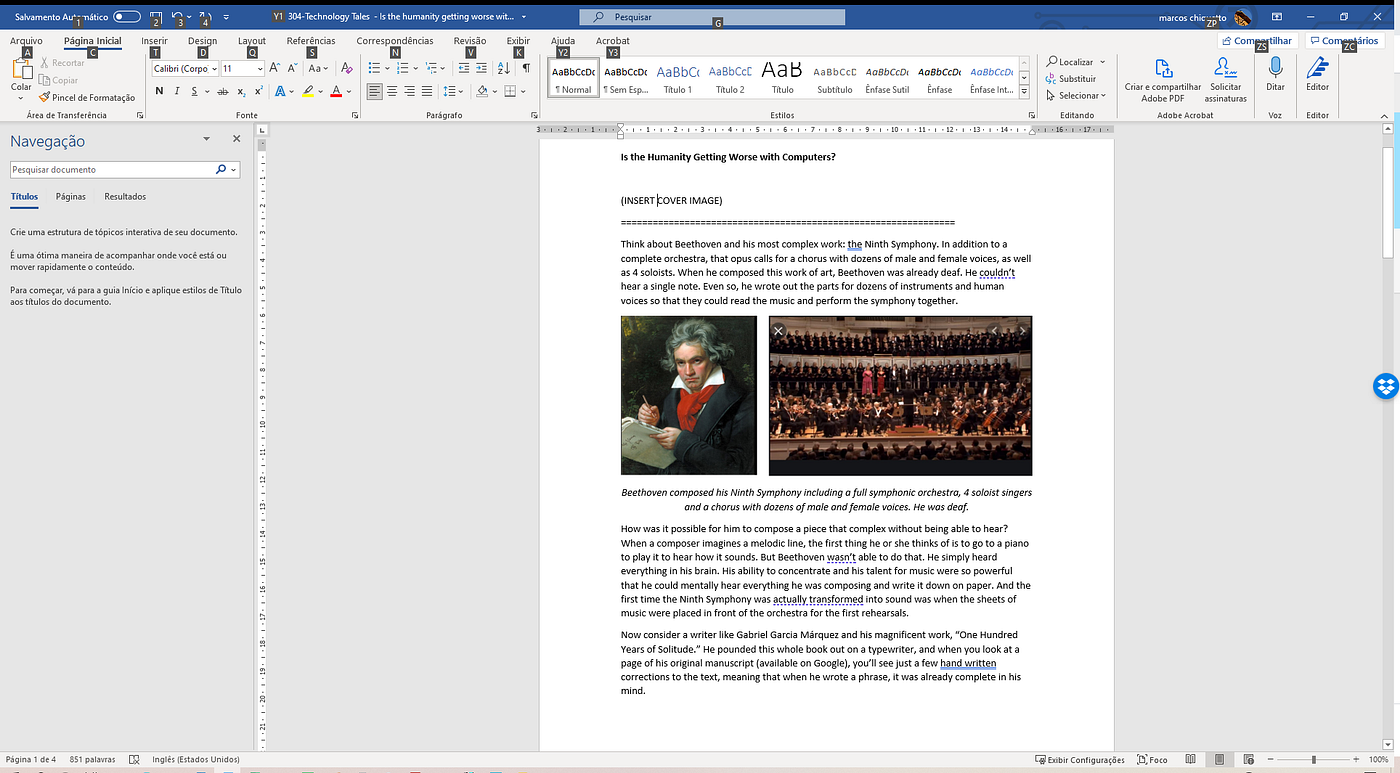Is the Humanity Getting Worse with Computers?
set 12 2025By Marcos Chiquetto

Think about Beethoven and his most complex work: The Ninth Symphony. In addition to a complete orchestra, that opus calls for a chorus with dozens of male and female voices, as well as 4 soloists. When he composed this work of art, Beethoven was already deaf. He couldn’t hear a single note. Even so, he wrote out the parts for dozens of instruments and human voices so that they could read the music and perform the symphony together.

How was it possible for him to compose a piece that complex without being able to hear? When a composer imagines a melodic line, the first thing he or she thinks of is to go to a piano to play it to hear how it sounds. But Beethoven wasn’t able to do that. He simply heard everything in his brain. His ability to concentrate and his talent for music were so powerful that he could mentally hear everything he was composing and write it down on paper. And the first time the Ninth Symphony was actually transformed into sound was when the sheets of music were placed in front of the orchestra for the first rehearsals.
Now consider a writer like Gabriel Garcia Márquez and his magnificent work, “One Hundred Years of Solitude.” He pounded this whole book out on a typewriter, and when you look at a page of his original manuscript you’ll see just a few handwritten corrections to the text, meaning that when he wrote a phrase, it was already complete in his mind.

The same thing could be said of journalists and essayists who wrote their material on typewriters up to 30 years ago. They didn’t have the luxury of being able to make many mistakes, because correcting them was a lot of work (you had to erase the mistake and rewrite it on the paper). The sentences had to be fully formed in their heads before they typed them.

Today, many composers work directly on a keyboard that is plugged into a computer. When a musical idea comes into their heads, they play it on the keyboard and it is immediately stored in the computer’s memory, able to be played back so that the composer can listen to it and modify it until it takes on its final form. Then they can compose another part, like a bass line, store it in memory, and play the two parts back together to see how it sounds. And a complex work can be built that way, adding one part at a time and listening back to it.

And what about me? I’m here writing this text on a computer, so I don’t have to formulate complete ideas in my mind. I can simply start writing and see how it looks, changing things and moving parts around until the text becomes something I’m satisfied with. The computer has become part of my brain. I depend on it to create a text.
And if I had to write this on a typewriter? Could I do it?
Honestly, I don’t know if I would be able to formulate complete sentences in my head that didn’t need to be adjusted. I think it would be much difficult.

What is the conclusion we can draw from this reflection? People were more competent in the old days? The human species has deteriorated since the arrival of computers?
No. What happens is that human beings have an incredible ability to adapt to the circumstances in which they find themselves. Musicians or writers in the old days simply didn’t have the tools to temporarily save their work, so that they could reflect on what they had done and make changes to it. They were obliged to imagine the things fully formed before they wrote them down, therefore they had to perfect it in their minds to the best of their ability. Today, we no longer have to do this, so we don´t have this skill much developed.
If there were to be a world-wide power failure, and all computers stopped working, humanity (or the small part of humanity that managed to survive) would probably develop these mental capabilities again.
A world-wide permanent power failure would probably force the survivors to develop again abilities of old.

But meanwhile, let’s just take advantage of the facilities the computer offers.

I am an engineer, physics teacher, translator, and writer. I am also director of LatinLanguages, a translation agency that provides multilingual companies and final clients with translation into Portuguese and Spanish. If you work with these languages, we are your best option—delivering world-class service at Brazilian prices.
Marcos Chiquetto




